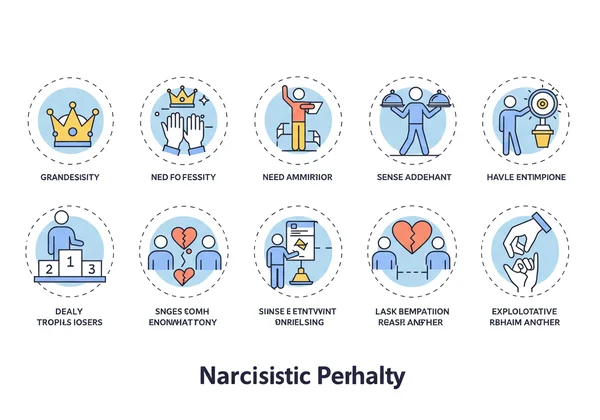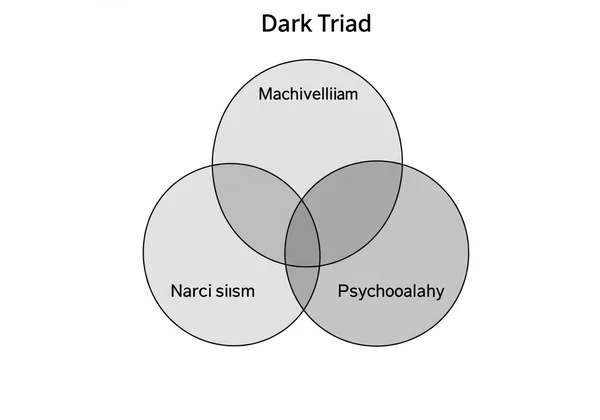Narcissism & Dark Triad Test: Understand Your Narcissistic Traits
September 7, 2025 | By Julian Vance
Have you ever wondered about the true nature of narcissism, especially how it fits within the broader concept of the Dark Triad? Often misunderstood as mere vanity, narcissistic traits are far more complex, impacting personal relationships, professional interactions, and self-perception. This comprehensive guide will unveil the psychological nuances of narcissism, explore its manifestation within the dark triad test framework, and answer the question: How do I know if I am dark triad? By the end, you'll understand yourself and others with greater clarity.
Often, we use the term "narcissist" casually to describe someone who seems self-absorbed or posts too many selfies. But psychologically, narcissism is a specific personality trait characterized by an inflated sense of self-importance, a deep need for excessive attention and admiration, and a lack of empathy for others. Understanding these traits is the first step toward genuine self-awareness and personal growth. Ready to explore your own profile? Start your assessment now to gain valuable insights.

What are Narcissistic Traits?
To truly grasp narcissism, we must move beyond stereotypes. Narcissistic traits exist on a spectrum, and understanding where they come from and how they appear is key to recognizing them in ourselves and others. This isn't about labeling but about gaining a clearer psychological vocabulary to describe human behavior.
Defining Narcissism: Beyond Simple Self-Love
The term "narcissism" originates from the Greek myth of Narcissus, a handsome youth who fell in love with his own reflection. This story captures the essence of the trait: a focus on the self that can become all-consuming. However, psychological narcissism is more than just vanity. It involves a fragile ego that is highly dependent on external validation to maintain a sense of superiority.
Individuals with prominent narcissistic traits often build a grandiose self-image to mask deep-seated feelings of insecurity. This internal conflict between their perceived greatness and underlying inadequacy drives much of their behavior. It's a defense mechanism that, while protective, can create significant challenges in forming genuine connections.
The Spectrum of Narcissism: Healthy Confidence vs. Unhealthy Patterns
It's crucial to distinguish between healthy self-esteem and unhealthy narcissism. Having confidence, ambition, and pride in your accomplishments is positive and necessary for success. Healthy confidence is rooted in real achievements and an accurate self-appraisal. It allows for resilience in the face of failure and the ability to celebrate others' successes.
Unhealthy narcissistic patterns, however, involve a distorted and brittle sense of self-worth. This often manifests as an inability to handle criticism, a constant need to be seen as the best, and a tendency to devalue others to feel superior. A confident person might say, "I'm proud of the work I did," while a person with narcissistic traits might say, "This project only succeeded because of me." Recognizing this difference is a vital part of self-reflection. If you're curious about your own balance of traits, a well-structured personality assessment can provide a helpful perspective.
Core Characteristics of Narcissistic Personality
While narcissism is complex, psychologists, based on extensive research, have identified several core characteristics that define it. These personality markers help differentiate it from simple arrogance or selfishness.
-
Grandiosity: An unrealistic sense of superiority and a belief that one is special and unique.
-
Need for Admiration: A constant craving for attention and praise from others to fuel their ego.
-
Sense of Entitlement: An unreasonable expectation of especially favorable treatment and automatic compliance with their desires.
-
Lack of Empathy: An inability or unwillingness to recognize or identify with the feelings and needs of others.
-
Exploitative Behavior: A tendency to take advantage of others to achieve their own ends.

Narcissism's Role in the Dark Triad Profile
Narcissism is one of three interconnected personality traits that form the Dark Triad, alongside Machiavellianism and psychopathy. While each trait is distinct, they often overlap, creating a complex behavioral profile. Understanding how dark triad narcissism functions within this constellation is key to a complete picture.
How Narcissism Interacts with Machiavellianism and Psychopathy
Think of the Dark Triad as a venn diagram of personality. Narcissism provides the ego and the driving need for status, Machiavellianism contributes the strategic, manipulative planning, and psychopathy adds impulsivity, thrill-seeking, and a profound lack of remorse.
When these traits combine, they can amplify one another. A person high in all three might use Machiavellian tactics to achieve the admiration their narcissism craves, all while feeling no guilt due to their psychopathic tendencies. This synergy explains why the Dark Triad is such a potent and often challenging personality structure to encounter. Gaining insight into this dynamic is a primary benefit of taking a comprehensive dark triad test.

Grandiosity vs. Vulnerability: The Dual Faces of Narcissism
Recent psychological research has revealed that narcissism isn't one-dimensional. The most commonly recognized form is grandiosity vs vulnerability; specifically, grandiose narcissism, which is characterized by extroversion, dominance, and an overt sense of superiority. These are the individuals who are charismatic, assertive, and command attention.
However, there is another, more subtle form: vulnerable narcissism. This type is defined by insecurity, defensiveness, and a hypersensitivity to criticism. While they still harbor fantasies of greatness, they are more introverted and may appear shy or anxious. Their narcissistic needs are often hidden behind a facade of victimhood or resentment. Both types share the same core of self-centeredness and entitlement, but they express it in very different ways.
Manifestations of Dark Triad Narcissism in Daily Life
How do dark triad people act? In everyday situations, these traits can appear in various ways. In the workplace, an individual with a high Dark Triad score might constantly take credit for team successes while blaming others for failures. They may charm superiors while manipulating colleagues, all to climb the corporate ladder.
In personal relationships, these traits can be particularly damaging. A partner with strong narcissistic tendencies may engage in "love bombing"—overwhelming affection and attention at the start—only to become controlling, critical, and emotionally distant once the relationship is established. They often struggle to maintain long-term, equitable partnerships because their need for admiration eventually overshadows their capacity for genuine connection.
Is a Narcissism Test for You? Identifying Narcissistic Traits
Self-discovery is a journey, and personality assessments are tools that can provide a map. A narcissism test isn't about receiving a diagnosis but about gaining a structured understanding of your own patterns of thought and behavior. It offers a mirror for self-reflection.
Self-Reflection: Recognizing Traits in Yourself and Others
The first step toward growth is honest self-assessment. Ask yourself questions like: Do I struggle to accept criticism, even when it's constructive? Do I often find myself feeling superior to those around me? Is it important that others see me as highly successful or special? Answering these questions honestly can be difficult, but it's an invaluable exercise in awareness.
Recognizing these traits in others is also a useful skill, particularly for protecting your own well-being in personal and professional settings. Understanding the behavioral patterns associated with narcissism can help you set healthy boundaries and manage difficult interactions more effectively.
The Purpose and Benefits of Personality Assessments
Personality assessments like the Dark Triad personality test serve a vital purpose. They translate complex psychological theories into objective, measurable data. Instead of vague self-reflection, you receive a concrete score that helps you understand where you fall on the spectrum for each of the three traits.
The benefit of such a tool is clarity. It provides a non-judgmental framework for understanding your own psychological makeup. For many users, seeing their results is an "aha" moment that connects disparate experiences and behaviors into a coherent pattern, empowering them to make conscious choices for personal development.
Uncover Your Dark Triad Profile for Deeper Insights
If you are a self-explorer, a psychology student, or a professional seeking to better understand human dynamics, exploring your Dark Triad profile is a powerful step. The test on our site is designed to be a secure, user-friendly, and scientifically grounded tool for this exact purpose.
Upon completion, you receive an instant report on your levels of narcissism, Machiavellianism, and psychopathy. For those seeking even more, our unique AI-powered analysis offers a personalized deep dive into what your scores mean for you, including your strengths, challenges, and actionable steps for growth. Discover your profile and begin your journey.

Embracing Awareness: Your Path to Self-Discovery
Understanding narcissistic traits and their place within the Dark Triad is not about judgment; it is about empowerment. Awareness is the key that unlocks personal growth, improved relationships, and a more authentic life. By looking honestly at these complex aspects of personality, we can learn to manage our tendencies and better navigate our interactions with others.
This knowledge empowers you to move from unconscious patterns to conscious choices. It is a journey of self-discovery that leads to greater emotional intelligence and resilience. We invite you to take the next step. Ready to explore? Take our free, confidential dark triad test and uncover the insights waiting for you.
Frequently Asked Questions About Narcissistic Traits
Is Narcissism Always Negative?
Not necessarily. In small doses, traits like ambition and self-confidence, which are on the narcissistic spectrum, can be highly beneficial, driving individuals to achieve great things. The problem arises when these traits become extreme, leading to a lack of empathy, entitlement, and exploitative behavior that harms others and oneself.
How Does Narcissism Relate to Healthy Self-Esteem?
Healthy self-esteem is based on a realistic and stable sense of self-worth. It allows for both self-acceptance and humility. Narcissism, in contrast, is often a mask for deep-seated insecurity and requires constant external validation. While someone with high self-esteem is resilient, a person with high narcissism has a fragile ego that is easily threatened.
What's the Key Difference Between Narcissism and Machiavellianism?
The primary motivator. What is Machiavellianism vs narcissism? Narcissism is driven by the need for ego-affirmation and admiration. Individuals high in narcissism want to be seen as superior. Machiavellianism, on the other hand, is driven by cold, calculated self-interest and a desire for power and control. While both can be manipulative, the narcissist does it for glory, while the Machiavellian does it for gain. A free dark triad test can help clarify these distinctions in your own profile.
Can Individuals with Narcissistic Traits Form Genuine Connections?
It can be challenging. Their core traits, particularly a lack of empathy and a need to be the center of attention, make it difficult to form the reciprocal, give-and-take relationships that are the foundation of genuine connection. However, with self-awareness and a conscious effort to develop empathy, personal growth is possible.
Disclaimer: This article is for educational and informational purposes only. It is not a substitute for professional psychological advice, diagnosis, or treatment.